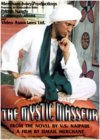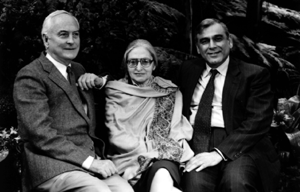FILM NOTES
FILM NOTES INDEX
NYS WRITERS INSTITUTE
HOME PAGE

 The Mystic Masseur
The Mystic Masseur
(India/United States, 2001, 117 minutes, color, 35mm)
Directed by Ismail Merchant
Starring Om Puri, Aasif Mandvi, Ayesha Dharker
Film script written by Caryl Phillips
(Writers Inst visit on Wed, September 28, 2005)
The
following film notes were prepared for the New York State Writers
Institute by Kevin Jack Hagopian, Senior Lecturer in Media Studies
at Pennsylvania State University:
When Ismail Merchant came to the University at Albany in 1989, it was just as his eagerly awaited film production of Tama Janowitz' novel Slaves of New York was being released. The Writers Institute had set up the event some time before, but we were excited because of the coincidence of the release of one of the Merchant-Ivory collaboration's most ambitious productions. But the film opened with a critical thud. And we were all rather nervous: how would we avoid mentioning the pasting the film was taking in the press during Ismail's visit?
 The Page Hall crowd that night for Merchant was a home field if ever there was one. Everyone there were fans of the literate, cosmopolitan trio of producer Merchant, director James Ivory, and screenwriter Ruth Prawer Jhabvala. The Merchant-Ivory combination had already given us such gems as Heat and Dust, The Bostonians, A Room with a View, and Maurice; Howard's End and The Remains of the Day were just over the horizon. Of the three artists, Ismail Merchant was the public face of the operation. Writer, award-winning documentarian, chef of note, legendary raconteur, charming to a fault, with a wit like sharp curry, Ismail Merchant had faced roomsful of skeptical bankers and come out of those encounters with enough money to film adaptations of Henry James and E.M. Forster. A Page Hall question-and-answer session would be a snap.
The Page Hall crowd that night for Merchant was a home field if ever there was one. Everyone there were fans of the literate, cosmopolitan trio of producer Merchant, director James Ivory, and screenwriter Ruth Prawer Jhabvala. The Merchant-Ivory combination had already given us such gems as Heat and Dust, The Bostonians, A Room with a View, and Maurice; Howard's End and The Remains of the Day were just over the horizon. Of the three artists, Ismail Merchant was the public face of the operation. Writer, award-winning documentarian, chef of note, legendary raconteur, charming to a fault, with a wit like sharp curry, Ismail Merchant had faced roomsful of skeptical bankers and come out of those encounters with enough money to film adaptations of Henry James and E.M. Forster. A Page Hall question-and-answer session would be a snap.
Merchant came on stage to the joyous applause of a movie-loving audience who had savored each new Merchant Ivory film as a small, perfect treat, like a sweet almond burfee. In return, he offered to us his elegance, his wide-ranging tastes, and his winning smile. Surely, we thought, no one would --
And then it came. A question from the audience: "Mr. Merchant, how do you feel about the terrible reviews Slaves of New York is getting?" The room collectively sucked in its breath at this display of bad manners. But we shouldn't have worried. Merchant shrugged, smiled broadly, and said, with staged indifference, "Well, the reviewers might be wrong, mightn't they?" He had us from right there, when we saw the stereotypically hard skin of a movie producer employed to show loyalty and love to his beloved colleagues, and let the big world be damned.
Ismail Merchant's passing, far too young, took from us one of the best of artisanal film producers. Like James Harris, Stanley Kubrick's early producer, Merchant understood at the deepest level how his unusual collaborators worked, and created a sheltered place for them to craft their exquisite, subtle films. Only Jack Rollins with Woody Allen has matched the Merchant-Ivory output for intelligence and longevity.
But Ismail Merchant was also a director, quietly, on the side. In his many years in the film business, he directed only six films, but each subject was chosen for its special resonance with his remarkable life. His last film as a director, 2001's Mystic Masseur, was no different: a story of an eccentrically talented, diasporic Indian whose wild self-assurance makes him the center of a diverse community within an already unique culture. The tale of Ganesh Ramsumair (Aasif Mandvi), a transplanted Indian in 1950's Trinidad who believes that fate has marked him for great things, and who sets out to meet his destiny as the writer of philosophical tracts and local seer. Actually, it is only Ganesh who has marked himself for great things, but his invented genius turns out to be prophetic. Some are born great, some have greatness thrust upon them, but Ganesh simply decides that he is great. Roger Ebert has called Ganesh "a thrift-shop Ghandi," and so he is, but Ganesh's improbable ability to elevate himself to provincial sainthood is a gentle, funny allegory for the insistence on the right of any so-called rootless person to claim his place in the sun, however far from home.
The Mystic Masseur was based on V.S. Naipaul's first novel, published in 1957. It speaks deeply of Merchant's standing in the world creative community that his was the first production Naipaul had ever allowed of one of his novels. Merchant had read the book when it was first published, and it had stayed with him, perhaps because of its mixture of Absurdist humor with real anti-colonialist criticism. For Merchant, this melding of styles into a masala of contrasting but somehow complementary tones has been one of the hallmarks of every film he was ever associated with.
Ismail Merchant said that, over the years, he had reread Naipaul's novel, "laughing and absorbing the roguish, crazy characters." And that is how we at the Writers Institute choose to remember him, not only as a great artist, but laughing and roguish, a character in the very best sense of the word.
— Kevin Hagopian, Penn State University
For additional information, contact the Writers Institute at 518-442-5620 or online at https://www.albany.edu/writers-inst.